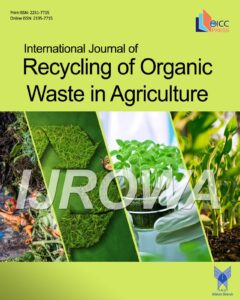Enriched animal manure as a source of phosphorus in sustainable agriculture
Authors
Abstract
Purpose Due to the pressures of conforming to environmental quality standards and the increased costs of mineral fertilizer importation, there is growing interest in the use of organic residues as fertilizers. To test the hypothesis that indicates the quantity of animal manure (AM) depends on the phosphorus (P) needs of the crops, an experiment was run using three organic animal manures (chicken-CM, turkey-TM, and cow manure-CoM), enriched with limestone, gypsum, and phosphorus.
Method A greenhouse experiment was run using AM incorporated in a clayey soil, at a rate that equates to the P needs of Brachiaria sp. Contents of phosphorus, potassium (K+), calcium (Ca+2), magnesium (Mg+2), sodium (Na+), organic matter (OM), and values of pH and cation exchange capacity (CEC) were monitored during 120 days. Plants were collected to determine the dry matter.
Results Application of enriched AM increased the contents of Ca, Mg, and K over time, while P and OM presented a decrease. Soil fertilized with CoM resulted in the greatest contents of P and OM, while soil with TM presented the highest production of dry matter with the lowest contents of P in soil. There was an increase in Na content in soil with the application of AM.
Conclusion Fertilization with AM presents the potential to supply P, Ca, Mg and K for plants. Enriched CoM appears to be the most viable option to improve the phosphorus and organic matter in soil because of high C/N. However, farmers may need to pay attention to the quantity of Na.




